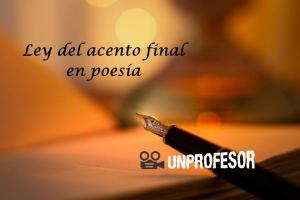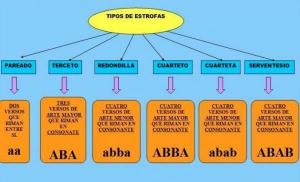5 differences between MYTH and LEGEND
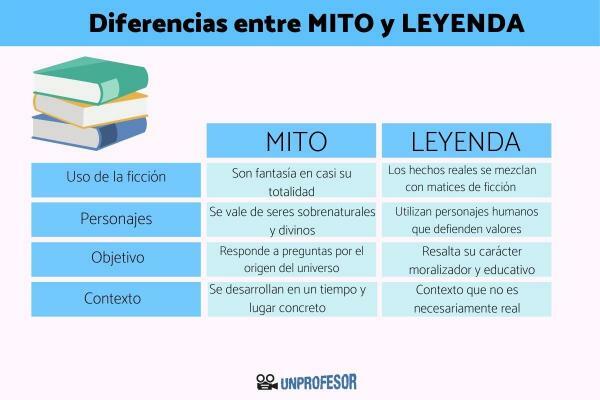
Literature has served as a vehicle for human beings to express ideas, traditions, customs and ways of thinking. We have transmitted it in written and oral form. Inside of oral tradition literature myths and legends are the oldest and most important forms that we have used. In this lesson from a TEACHER we will discover what the Difference between myth and legend. We will give a definition of each one so that you know them in depth and then we will compare them.
If we want to understand the difference between myth and legend, it is pertinent that we first understand what each one means.
The myth is a tale of a wonderful character that is carried out by divine beings: gods, demigods or, even, monsters. Usually these types of stories have a symbolic meaning that seeks to answer existential questions, situations or events unknown to a specific society or people. For this reason, myths usually deal with topics such as the origin of the world, the universe, time, destiny or natural phenomena.
Myths usually generate a web of stories that can connect with each other. In the myths of ancient Greece the gods were attributed various powers such as war, love, natural life, etc. For example, lightning in storms was associated and explained in stories related to the
God Zeus. Particularly, each culture has its mythology and in ancient times it was a fundamental part of the ideas of a society.Characteristics of myths
Now, with this central idea of the meaning of a myth, it is worth emphasizing the elemental characteristics That composes:
- Goal of the myth: Starting with the most important, the myth mainly seeks to explain what a society does not know or understand. To respond to these concerns, they use a symbolic and easily understood narrative.
- Authorship: in general, myths are not associated with a particular author. They are usually the result of the cosmology of a people and are created socially. For this reason, its transmission usually occurs orally from generation to generation.
- Space: Although it can take place in spaces known to humans, various myths can take place in fantastic places outside the earthly plane.
- Characters: They are usually carried out by divine or supernatural beings such as gods or demigods. These characters stand out for possessing outstanding physical and mental faculties that are associated with the control of elements of nature.
- Timelessness: When dealing with general questions of a people, myths are not connected with concrete and true historical events, their explanations and teachings seek to be timeless.
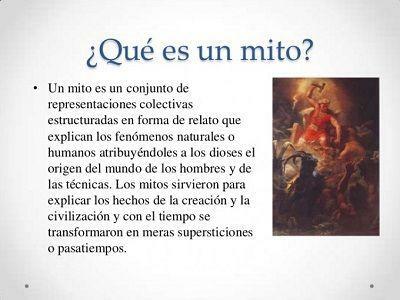
Legends are short stories composed of a approach, middle and end. In his narration mix real facts with fiction and seek to leave a moral message to whoever reads or listens to it.
Like myth, legends have been passed down generationally orally. However, today the myths and legends of the past are also found in books and on the web.
Legends features
Legends have a popular origin, therefore they are part of the culture of a community. Before moving on to the difference between myth and legend, we must remember what the elemental characteristics that make up a legend:
- Legend objective: This type of narration seeks to instruct or leave a series of teachings by returning to characters or real events. It usually instills values such as courage, honor, responsibility, among others.
- Characters: With a heroic character, the characters of the legends face adventures and difficulties that they must solve. For their actions they are remembered within their culture and determine an idea of morality; what must be done and the values that must be defended.
- Temporality: Within its real components, legends occur in a specific historical period and place.
- Use of fiction: Although we have talked about a story that is based on real events, it takes a creative license and is nourished by fantastic elements.
- It varies in its types: the leyends vary in their types and they are classified according to their relationship with religion, nature, or the issues they come to address.
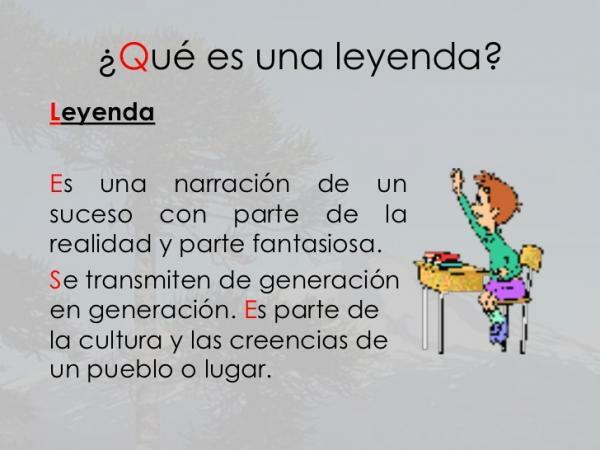
By understanding what each of these narratives means and what their main characteristics are, we can highlight their differences:
- Use of fiction: while mythological narratives are almost entirely fantasy, legends seek a middle ground where real events are mixed with nuances of fiction that highlight the heroism or characteristics of a place or character.
- Characters: In accordance with the previous point, the legends use human characters who defend certain values within a historical event. On the contrary, the myth uses supernatural and divine beings to build its story.
- Objective: As we could identify at the beginning of this article, the myth answers questions about the origin of the universe, it is interested in explaining natural or existential phenomena. In the case of the legend, it highlights its moralizing character and the idea of leaving certain teachings through the exploits of its characters.
- Context: while legends are developed in a specific time and place to have a verisimilitude, myths have a context that is not necessarily real.


